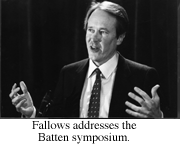Summer 1996
The Puff Adder’s Nest of Modern Journalism
The 1996 James K. Batten Symposium on Excellence in Civic Journalism
Symposium Keynote Speaker
James Fallows
Breaking the News, How the Media Undermine American Democracy
Washington Editor, The Atlantic Monthly
When I first heard about the public/civic journalism movement, I was impressed with the similarity of spirit between the critique it offered and what the defense reformers had been trying to do. I believe, now, that there will be a further similarity: Public journalism will triumph (like the defense reformers did) when people stop using the label and just incorporate the ideas.
Two years ago I had never heard the term public journalism. I came across it only during the research of my recent book. I already had a very clear sense of what was wrong with modern journalism. I thought it was also important to listen to people with ideas about correcting what was wrong. I ended up meeting with people in the public journalism movement, including a number in this room. What struck me is that they were trying seriously to come up with new ideas. They had a clear-eyed sense of where mainstream journalists had broken down. More important, they were — very much like the defense reformers — willing to experiment, criticize, and think freely to come up with possibilities of better ideas.
Not all their ideas were brilliant or practical, and they did not agree among themselves on every point. But unlike so many leading journalists, who smugly told themselves that the blame for tawdry journalism lay solely with a tawdry-minded public, these journalistic reformers were saying: Let’s find new ways to deal with the fundamental problems that seem to be driving us away from our audience, from our public, and from the causes that originally brought us into that business. I tried in the final chapter of Breaking the News to explain that perspective.
Little did I imagine that would be by far the most controversial and criticized aspect of my argument. I don’t mean criticism by “civilian” readers outside the journalism business. I am referring only to in-house criticism from the most powerful institutional voices of our business — the editors and retired editors of our leading papers, those who view their duty as safeguarding journalism’s independence.

I had expected many of them to receive the public journalism concept as I did — as a source of varied, potentially valuable suggestions for rejuvenating our craft.
You can imagine my surprise to find that this is sort of the puff adder’s nest of modern journalism, where you stick your hand in and the puff adders come out from all corners of the swamp.
I’ve had many occasions in the last few months to speculate on the origins of this hostility. It has all the marks, by the way, of a reflex action, rather than a reasoned counter-argument. My purpose today is to suggest some of the sources of the reaction and the ways it might abate.
In fairness to the critics, we should start with the most serious and weighty objections to public journalism — the worst excesses that can be committed in public journalism’s name.
First is a genuine suspicion about projects done for fundamentally commercial reasons, which are then decorated with a “public journalism” label. Publishers and marketing directors have since time immemorial looked for ways to promote their product. In some papers, public journalism is being used as this week’s gimmick and is not much more serious than the two-for-one coupons or other gimmicks used the week before. Everyone in this room would agree that this is not what we mean by the promise of public journalism.
A second genuine fear is a slippery-slopeism when it comes to local political causes. In many towns for many years it has been all too common for the newspaper publisher to be a big figure in local politics and commerce. Having defined journalistic integrity as the struggle to move away from such complications, many journalists fear that public journalism will push them right back into the cozy, log-rolling habits of the old days. All of us should concede this as a possible harmful abuse of the movement.
A third complaint is harder for the complainants to defend on purely logical grounds, but it obviously has great emotional appeal. This is a larger concept of slippery-slopeism involving government as a whole.
A number of people have used my own history as a cautionary example, so I should address it here. With every person in this room, I believe in the First Amendment, in a press that is uncontrolled by government, and in a press that is structurally and emotionally separate from government. And I believe that part of our duty is to point out what is going wrong with government, in keeping with our place in the check-and-balance system.
But I do not believe that we must always view government as an evil enterprise — as vice-squad agents would view the drug trade — as something that will taint us forever if we have any contact with it. On the contrary, I have always believed it is good for journalists, once in their lives, to have first-hand experience in some of the fields they are going to cover. I say “one-time” because I recognize the danger in “commuting.” If you are going back and forth from one realm to the other, people may be suspicious of you in either guise. Are you angling to get a government appointment through your writing as a reporter? Are you storing up journalistic tidbits during the time you’re working inside?
